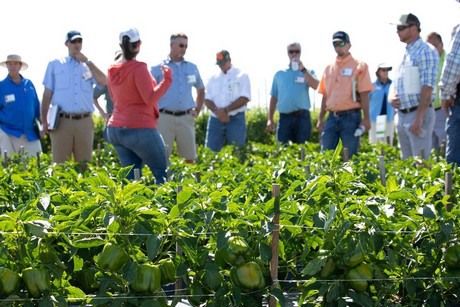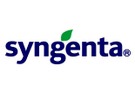The Syngenta Vegetable Seeds Americas Tour stopped at several research stations across the nation this summer. Each event highlighted crop species from the Syngenta portfolio and featured new commercially available varieties as well as experimental material coming soon.

The Americas Tour began in Woodland, California, where domestic and international customers had access to the newest product offerings from Syngenta in tomato, melon, squash, pepper, bean, sweet corn and watermelon. In addition, customers had the opportunity to meet with the company’s breeding, sales and product development teams to learn more about the newest technologies and innovations being developed by Syngenta.
At the Woodland event, Les Padley, Ph.D., squash breeding project lead at Syngenta, announced the newly granted U.S. potyvirus patent. This technology provides broad resistance to four of the most common potyviruses and will continue to be incorporated into new squash varieties. Syngenta also introduced several new melon varieties, including Harper-type melons Novira and Sweet Shield. For the Mexican markets, new western shipper melons T-Rex and Tarasco demonstrated high fruit quality in Syngenta trials. Additionally, Syngenta debuted new ESL melons, which exhibit improved taste and holding ability in the field, as well as longer shelf life in stores. The well-received Syngenta watermelon program, including consistent, adaptable and flavorful varieties such as Excursion and Fascination, was also a highlight.
Simultaneous to the Woodland trial event, the Americas Tour stop in Plainfield, Wisconsin, demonstrated advancements in vegetable breeding. This location hosted customers primarily from the Midwest, but also welcomed international attendees. Trials highlighted a range of products, including processor and fresh market sweet corn and beans.
“Syngenta processor sweet corn hybrids have a long history of leading the market with our Midwest customers,” said Joe Cecil, processor sales manager at Syngenta. “During trial week, we were proud to showcase an exciting pipeline of new introductions and evolving technology to continue our tradition of introducing hybrids that satisfy our customer needs as well as the demands of their customers.”
For fresh market sweet corn, newer supersweet varieties such as Patriarch stood out at the Plainfield event for their superior eating quality and adaptability to multiple growing regions. Syngenta also debuted new experimental Cabo-type yellow varieties with disease resistance. “The Syngenta sweet corn program has been ahead of the curve when it comes to developing varieties with good disease packages,” said Glenn McKay, Syngenta regional portfolio manager. “We are excited to see the continued development of the Syngenta sweet corn program with the newly integrated Abbott & Cobb germplasm, which expands our overall genetic diversity in temperate and tropical markets.”
The Americas Tour continued in Hall, New York, where seed resellers had the opportunity to see a range of the latest Syngenta products. Organizers at this tour stop highlighted Grandprize squash for its beautiful deep-yellow color and exceptional plant vigor, as well as, personal-sized seedless watermelon Sirius for its uniform fruit size and earlier maturity. Glacial sweet corn also continues to stand out for its high eating quality, vibrant white kernel color and great husk marketability.
The last location for the summer portion of the Americas Tour was Gilroy, California, where tomato, leafy vegetable, brassicas and pepper took center stage. Wildcat tomato stood out as a high-yielding variety that tolerates varied temperatures on the coast. In addition, new leafy variety Boronda was showcased for its strong disease package, compact heart and very dense interior fill. Lacerta cauliflower, with its vigor and good self-protection, demonstrated that it is an ideal complement to Symphony cauliflower in the California overwinter and spring slot. Also showcased were soon-to-be commercialized 4-lobbed blocky pepper varieties with milestone resistance to TSWV and consistent high yield potential.
The Americas Tour will conclude in December with an additional event in Naples, Florida.
For more information: Syngenta Vegetable Seeds
Syngenta Vegetable Seeds
www.Syngenta-US.com/vegetables
